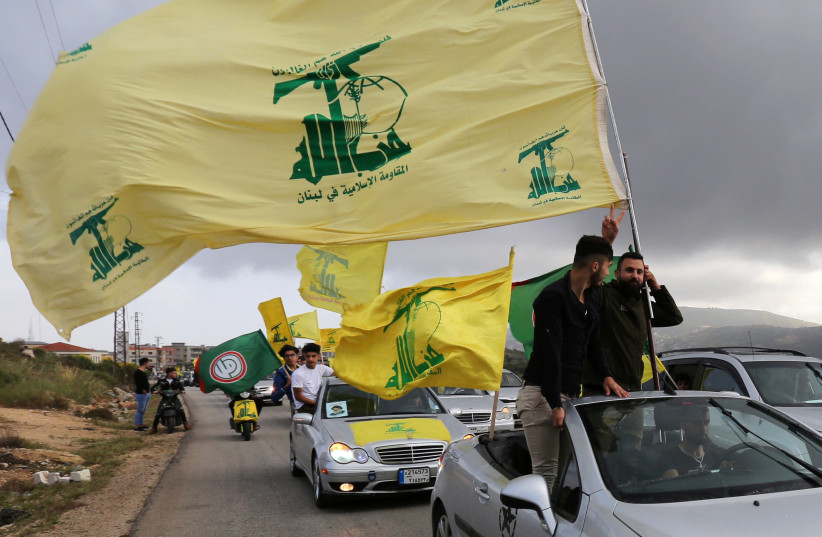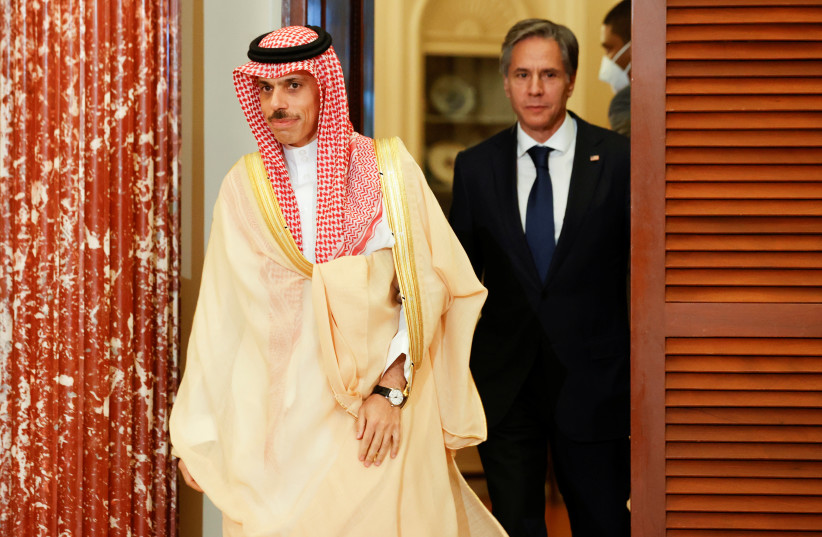Saudi Arabia and Bahrain have expelled Lebanon’s ambassadors in recent days. Hezbollah may see an opening and could increase tensions
WAVING THE Hezbollah flag in Marjayoun, Lebanon.
A crisis between Hezbollah and Saudi Arabia is growing.
“We are facing a crisis created by one of the countries in the region, which is waging a brutal war against another Arab country,” said Mohammed Raad, head of the Hezbollah faction in the Lebanese parliament.
The regional tensions could also affect Israel.
Raad was quoted in Iranian media in recent days. His comments refer to Saudi Arabia’s “hostile” actions against Lebanon. In fact, Riyadh responded to a Lebanese official supporting the Houthi rebels in Yemen after Lebanese Information Minister George Kordahi had appeared to praise the Houthis.
The Hezbollah official said: “One of the ministers of the Lebanese government issued a statement in support of the right of the Yemeni people to protect themselves against the aggressor coalition that has invaded their country, before assuming the post of minister in this government.” Saudi Arabia and Bahrain have expelled Lebanon’s ambassadors in recent days. Lebanon’s president is seeking to heal the rift. Hezbollah may see an opening and could increase tensions. Saudi Arabia wants to harm the “stability” of Lebanon, the official said. In fact, Lebanon is unstable and bankrupt.
US Secretary of State Antony Blinken and Saudi Arabia’s Foreign Minister Faisal bin Farhan Al-Saud deliver remarks to reporters before meeting at the State Department in Washington, US, October 14, 2021. (credit: REUTERS/JONATHAN ERNST)
Hezbollah claims to be concerned that Riyadh might be making more light of the controversy because of upcoming elections. However, the reality may be that Hezbollah is trying to stoke a controversy to get votes or create a crisis.
Raad said: “Those who are creating a crisis for Lebanon do not want the elections to be held in this country, and they intend to disrupt these elections, and perhaps they realized that the results of the next elections will not be the way they want them to be.”
Thirty years ago, Saudi Arabia was key to the Taif Agreement that ended the Lebanese Civil War. Riyadh is seen as generally supporting the status quo and Sunni politicians in Lebanon, such as Saad Hariri. Hezbollah murdered Hariri’s father, Rafic in 2005.
In recent years, Riyadh has grown tired of backing a Lebanon that continues to be swallowed by Hezbollah. Hezbollah maintains an illegal terrorist army in Lebanon with 150,000 rockets, undermines Lebanon’s foreign policy, conducts its own policies, has its own communications network and in many ways is more powerful than the state.
Israel is conducting a national readiness drill this week. Starting Sunday, Home Front Command and the National Emergency Authority (RAHEL) are holding a weeklong drill that simulates a large-scale war in which civilians may be evacuated from northern border communities in response to rocket barrages from Hezbollah, according to reports.
It is not clear if Hezbollah will exploit regional tensions in this regard. Hezbollah wants closer ties with the Houthis in Yemen, and Iran is exporting the same technology to Hezbollah, Hamas and the Houthis, such as drones and rockets. The US recently sanctioned key figures in the drone program in Iran. The US also imposed sanctions on Lebanese businessmen and a member of Lebanon’s parliament, Jamil Sayyed.
This means regional tensions are entwined and heating up. Iran used drones to attack a ship in the Gulf of Oman in July. A drone attacked the US garrison at Tanf in late October. Hezbollah has increasingly mentioned Yemen in statements. In January, reports said Iran may have sent drones to Yemen. These had a range that could threaten Israel.





Something similar has been happening in this country where the rightful victims are now qualified as “terrorists”!
The “stability” of Lebanon! That brings to mind the 2nd and 3rd laws of thermodynamics!